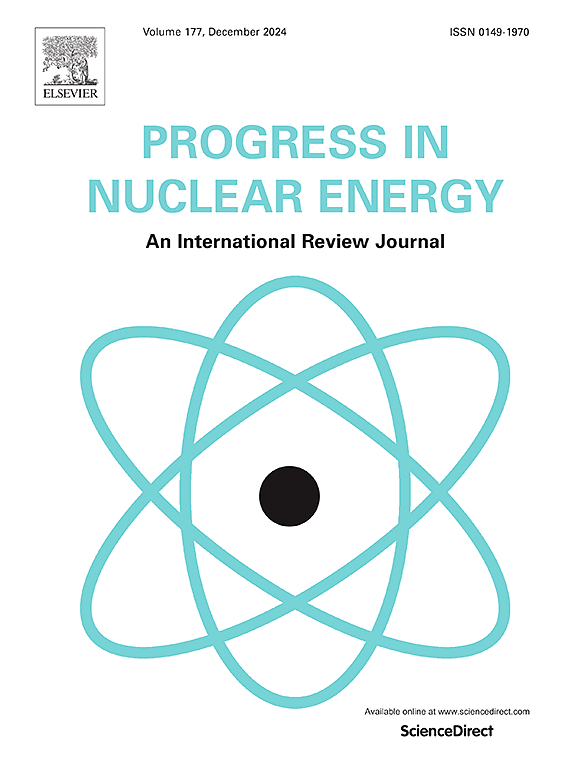基于模糊层次聚类和改进遗传算法的船舶SMR系统模块化设计方法研究
IF 3.3
3区 工程技术
Q1 NUCLEAR SCIENCE & TECHNOLOGY
引用次数: 0
摘要
海洋小型模块化反应堆(MSMR)将小型模块化反应堆技术与船舶技术相结合,在满足开阔海洋和偏远岛屿的能源需求方面具有独特的价值。然而,MSMR 的设计和建造面临着空间限制、复杂的系统集成以及需要适应先进的船舶模块化建造技术等挑战。因此,需要采用高效的模块分区方法来提高整体效率和可靠性。MSMR 系统的模块划分需要考虑多种因素,是一个具有性能约束的组合优化问题。本研究旨在反映系统层次树的内部结构,为模块划分提供明确的指导,提高解决组合问题的计算效率。本文提出了一种基于模糊分层聚类和遗传算法的 MSMR 系统模块划分和优化方法。首先,利用模糊分层聚类将小型模块化反应堆电站系统的组件聚类为不同级别的模块。随后,采用遗传算法解决模块划分方案的组合优化问题,最终得出最优划分方案。通过放射性废气系统(WGS)的模块案例,验证了该方法的可行性和有效性。该方法可为整个海洋模块化反应堆系统的模块化设计提供指导。本文提供的方法可为未来 MSMR 模块化设计提供研究基础,提高设计效率。本文章由计算机程序翻译,如有差异,请以英文原文为准。
Study on modular design methodology of marine SMR system based on fuzzy hierarchical clustering and improved genetic algorithm
Marine Small Modular Reactors (MSMR) integrate SMR technology with ship technology, offering unique value in meeting the energy demands of the open ocean and remote islands. However, the design and construction of MSMR face challenges such as space constraints, complex system integration, and the need to adapt to advanced ship modular construction technologies. Therefore, efficient modular partitioning methods are required to enhance overall efficiency and reliability. The module partitioning of MSMR systems takes into account multiple factors and is a combinatorial optimization problem with performance constraints. This study aims to reflect the internal structure of the system hierarchical tree, provide clear guidance for module partitioning, and improve the computational efficiency of solving combinatorial problems. This paper propose a module division and optimization method for MSMR systems based on fuzzy hierarchical clustering and a genetic algorithm. Initially, the components of the small modular reactor power plant system are clustered into modules of different levels using fuzzy hierarchical clustering. Subsequently, a genetic algorithm is employed to solve the combinatorial optimization problem of the module division scheme, resulting in the optimal division scheme. The feasibility and effectiveness of the method are verified through the modular case of the Radioactive Waste Gas System (WGS). This method can provide guidance for the modularization design of the entire ocean modular reactor system. The method provided in this article can provide a research foundation for future modular design of MSMR and improve design efficiency.
求助全文
通过发布文献求助,成功后即可免费获取论文全文。
去求助
来源期刊

Progress in Nuclear Energy
工程技术-核科学技术
CiteScore
5.30
自引率
14.80%
发文量
331
审稿时长
3.5 months
期刊介绍:
Progress in Nuclear Energy is an international review journal covering all aspects of nuclear science and engineering. In keeping with the maturity of nuclear power, articles on safety, siting and environmental problems are encouraged, as are those associated with economics and fuel management. However, basic physics and engineering will remain an important aspect of the editorial policy. Articles published are either of a review nature or present new material in more depth. They are aimed at researchers and technically-oriented managers working in the nuclear energy field.
Please note the following:
1) PNE seeks high quality research papers which are medium to long in length. Short research papers should be submitted to the journal Annals in Nuclear Energy.
2) PNE reserves the right to reject papers which are based solely on routine application of computer codes used to produce reactor designs or explain existing reactor phenomena. Such papers, although worthy, are best left as laboratory reports whereas Progress in Nuclear Energy seeks papers of originality, which are archival in nature, in the fields of mathematical and experimental nuclear technology, including fission, fusion (blanket physics, radiation damage), safety, materials aspects, economics, etc.
3) Review papers, which may occasionally be invited, are particularly sought by the journal in these fields.
 求助内容:
求助内容: 应助结果提醒方式:
应助结果提醒方式:


